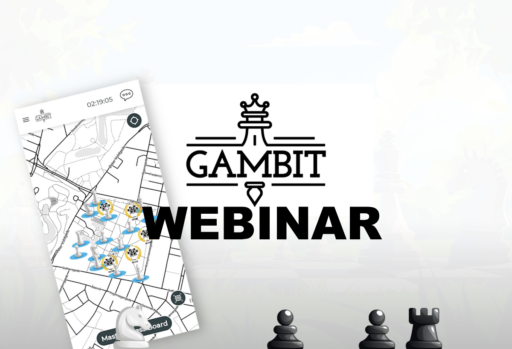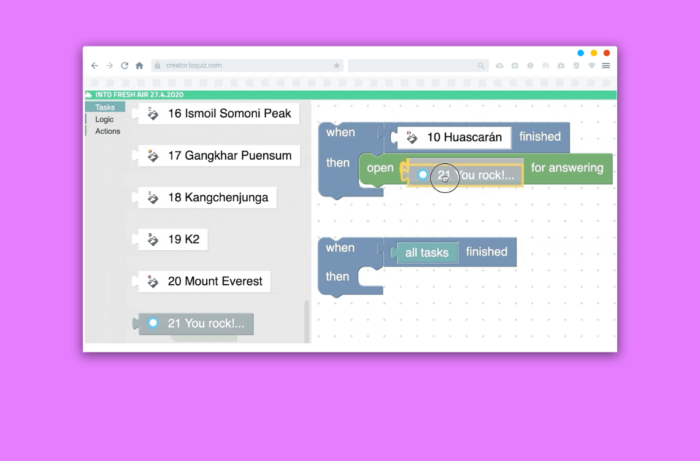Lately, we have noticed that Loquiz games have witnessed a significant increase in complexity and scale. This trend, alongside the growing number of players and the emphasis on player interactions, poses unique challenges for game creators.
While there are no hard limits on the number of tasks or rules that can be incorporated, the actual impact on device performance depends on various factors. This also means that as a game creator, you need to practice caution when creating and running games. A clear indicator of a struggling device is a noticeable slowdown in responsiveness and screen updates.
Below I cover the main factors and their effect that you should take into account when developing games. While individual factors may not significantly impact game performance on their own, their combined effect can become noticeable.
Number of tasks
Loquiz Support base states that we officially recommend up to 100 tasks if using maps, but also that you should generally be fine with up to 200 tasks (especially if they are not all on map). While tasks themselves do not put a strong load on the device, each task has some default rules that are parsed by the device and these rules affect the device’s performance. The more tasks, the more caution you need to take when testing your creations.
Number of locations
Tasks with coordinates are usually shown on the map and showing many icons dynamically on the map can be very taxing for the device. You should generally be fine if you use less than 100 locations to show on the map. Locations put stress mainly in two ways: displaying on the map and also checking how far a player is from each location. So this adds additional load to the rule parsing for the device.
Number of rules
As mentioned, every task added to the game generates default rules. Also, every location activation added to a task adds the rule of activation. So the default ruleset is a big part of the rules already. The rules you create through a Visual Editor will also affect the performance. You can easily see the number of blocks you have added in the Creator by right-clicking on any rule. However, the number of blocks is not always representative of the number of rules.
The reason why the number of rules is important is that mobile devices parse rules periodically and in some specific events. If the device is not capable of parsing the ruleset within a short timeframe, the device will start getting slower, and weaker devices might hang.
Less than 1000 blocks should usually work without problems.
Some rules affect performance more than others
How much load a rule puts on the device is kind of dependent on how the specific rule works. Location activation rules are some of the most taxing rules because, at every location change, we need to check if the device is within any activation boundary. Also, timers are generally more taxing, so if you are using many activation rules connected to timers, then expect it to put more load on the mobile device. An example of a less taxing rule is the “when answered” block.
The number of players in the same scope
Some rulesets in Loquiz are interactive – one player affects another player. For example, “ANSWER IS CORRECT/INCORRECT BY ANY TEAM”. This block is important because it will force much more frequent rule parsing than usual. The more players, the more times the data needs to be updated and rules parsed by every device. Also, some other functionalities like showing all players on the map or showing the score of all players for every player will affect the performance if there are many players. We recommend not using interactivity if there are more than 100 players.
As a rule of thumb, you should generally be ok with up to 100 players.
Other things affecting the performance
The above is just a brief overview of some of the factors that can impact device performance. Additionally, the game’s performance can be affected by memory usage (if images are attached to tasks or as icons or as map overlay) or by network speeds if there are many video tasks in the game.
You might be reading this and thinking: What? I have made games with more rules, tasks, and players than that and had no problems. Yes, you are right, there are way bigger games that work flawlessly. The message here is that by pushing the boundaries of game size and player amount to the limits, please exercise more caution because can introduce performance issues and even compromise the overall experience.
Related stories

Are you looking for the perfect team-building activity? Look no further! We’re excited to introduce GAMBIT, a new team-building game...

Playing games is fun, but creating games is even better. What if you generate a profit from your own game...

I might surprise you with the following statement, but I consider that testing is even more important than development. Look...
Start free trial to bring your ideas to life
Sign up and create games, tours, team events and educational content that captures peoples' attention
Start from the scratch or use templates to kickstart!

